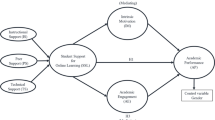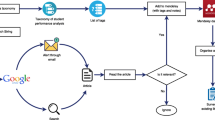Abstract
Although millions of students have access to varieties of learning materials in Massive Open Online Courses (MOOCs), many of them feel lost or isolated in their learning experience. One of the potential reasons is the lack of interactions and guidance for individuals. Since MOOC students have diverse learning objectives, we propose to design different strategies for those students with different engagement styles. In this paper, we provide personalized learning guidance for MOOC students based on multi-source data analysis. We first conduct content analysis to identify key concepts in the courses. We then propose two structured model to evaluate student knowledge states by their quiz submissions. We also study on student learning behaviors and design a dropout prediction system. The experiments show the effectiveness of our algorithms and we discuss on the result both quantitatively and qualitatively. Last but not least, we employ a Web application of online student assessment service for both students and instructors, in order to display student learning states and provide suggestion for individuals.













Similar content being viewed by others
References
Agrawal, A., Venkatraman, J., Leonard, S., Paepcke, A.: Youedu: addressing confusion in Mooc discussion forums by recommending instructional video clips. In: Educational Data Mining 2015, pp. 297–304 (2015)
Anderson, A., Huttenlocher, D., Kleinberg, J., Leskovec, J.: Engaging with massive online courses. In: Proceedings of the 23Rd International Conference on World Wide Web, pp. 687–698. ACM (2014)
Basu, S., Wu, A., Hou, B., DeNero, J.: Problems before solutions: automated problem clarification at scale. In: Proceedings of the Second ACM Conference on Learning@ Scale, pp. 205–213. ACM (2015)
Blei, D.M., Ng, A.Y., Jordan, M.I.: Latent dirichlet allocation. J. Mach. Learn. Res. 3(Jan), 993–1022 (2003)
Bougouin, A., Boudin, F., Daille, B.: Topicrank: graph-based topic ranking for keyphrase extraction. In: International Joint Conference on Natural Language Processing (IJCNLP), pp. 543–551 (2013)
Breslow, L., Pritchard, D.E., DeBoer, J., Stump, G.S., Ho, A.D., Seaton, D.T.: Studying learning in the worldwide classroom: Research into edx’s first mooc. Res. Pract. Assess. 8, 13–25 (2013)
Chaturvedi, S., Goldwasser, D., Daumé, H. III: Predicting instructor’s intervention in Mooc forums. In: Proceedings of the 52nd Annual Meeting of the Association for Computational Linguistics, pp. 1501–1511. ACL (2014)
Chen, Y., Zhang, M.: Mooc student dropout: pattern and prevention. In: Proceedings of the ACM Turing 50th Celebration Conference-China, pp. 4:1–4:6. ACM (2017)
Conole, G.: Moocs as disruptive technologies: strategies for enhancing the learner experience and quality of moocs. Revista de Educación a Distancia (39), 1–17 (2015)
Corbett, A.T., Anderson, J.R.: Knowledge tracing: modelling the acquisition of procedural knowledge. User Model. User-Adap. Inter. 4(4), 253–278 (1995)
Davis, D., Chen, G., Van der Zee, T., Hauff, C., Houben, G.J.: Retrieval practice and study planning in Moocs: exploring classroom-based self-regulated learning strategies at scale. In: European Conference on Technology Enhanced Learning, pp. 57–71. Springer, New York (2016)
Guo, P.J., Kim, J., Rubin, R.: How video production affects student engagement: an empirical study of Mooc videos. In: Proceedings of the First ACM Conference on Learning@ Scale Conference, pp. 41–50. ACM (2014)
Hmedna, B., El Mezouary, A., Baz, O., Mammass, D.: Identifying and tracking learning styles in moocs: a neural networks approach. Int. J. Innov. Manag. Appl. Stud. 19(2), 267 (2017)
Ho, T.K.: Random decision forests. In: Proceedings of the Third International Conference on Document Analysis and Recognition, vol. 1, pp. 278–282. IEEE (1995)
Jiang, Z., Zhang, Y., Li, X.: Moocon: a framework for semi-supervised concept extraction from Mooc content. In: International Conference on Database Systems for Advanced Applications, pp. 303–315. Springer, New York (2017)
Jing, X., Tang, J.: Guess you like: course recommendation in Moocs. In: Proceedings of the International Conference on Web Intelligence, pp. 783–789. ACM (2017)
Jordan, K.: Initial trends in enrolment and completion of massive open online courses. IRRODL 15(1), 133–160 (2014)
Khajah, M., Lindsey, R.V., Mozer, M.C.: How deep is knowledge tracing?. In: Educational Data Mining 2016, pp. 94–101 (2016)
Khosravi, H., Cooper, K., Kitto, K.: Riple: Recommendation in peer-learning environments based on knowledge gaps and interests. JEDM 9(1), 42–67 (2017)
Kim, T.d., Yang, M.y., Bae, J., Min, B.A., Lee, I., Kim, J.: Escape from infinite freedom: effects of constraining user freedom on the prevention of dropout in an online learning context. Comput. Hum. Behav. 66, 217–231 (2017)
Kizilcec, R.F., Pérez-Sanagustín, M., Maldonado, J.J.: Recommending self-regulated learning strategies does not improve performance in a Mooc. In: Proceedings of the Third (2016) ACM Conference on Learning@ Scale, pp. 101–104. ACM (2016)
Kolowich, S.: Coursera takes a nuanced view of mooc dropout rates the chronicle of higher education (2013)
Kovacs, G.: Effects of in-video quizzes on Mooc lecture viewing. In: Proceedings of the Third ACM Conference on Learning@ Scale, pp. 31–40. ACM (2016)
Kulik, J.A., Kulik, C.L.C.: Timing of feedback and verbal learning. Rev. Educ. Res. 58(1), 79–97 (1988)
Kulkarni, C.E., Bernstein, M.S., Klemmer, S.R.: Peerstudio: rapid peer feedback emphasizes revision and improves performance. In: Proceedings of the Second ACM Conference on Learning@ Scale, pp. 75–84. ACM (2015)
Li, W., Gao, M., Li, H., Xiong, Q., Wen, J., Wu, Z.: Dropout prediction in Moocs using behavior features and multi-view semi-supervised learning. In: International Joint Conference on Neural Networks (IJCNN), pp. 3130–3137. IEEE (2016)
Liu, C.C., Chang, C.J., Tseng, J.M.: The effect of recommendation systems on internet-based learning for different learners: a data mining analysis. Br. J. Educ. Technol. 44(5), 758–773 (2013)
Matsuda, N., Furukawa, T., Bier, N., Faloutsos, C.: Machine beats experts: automatic discovery of skill models for data-driven online course refinement. In: Educational Data Mining 2015, pp. 101–108 (2015)
Mihalcea, R., Tarau, P.: Textrank: bringing order into Texts. In: Conference on Empirical Methods in Natural Language Processing, pp. 404–411. ACL (2004)
Onah, D.F., Sinclair, J., Boyatt, R.: Dropout rates of massive open online courses: behavioural patterns. In: International Conference on Education & New Learning Technologies, pp 5825–5834 (2014)
Page, L., Brin, S., Motwani, R., Winograd, T.: The pagerank citation ranking: bringing order to the Web. Tech. Rep., Stanford InfoLab (1999)
Pan, L., Li, C., Li, J., Tang, J.: Prerequisite relation learning for concepts in Moocs. In: Proceedings of the 55th Annual Meeting of the Association for Computational Linguistics, pp 1447–1456. ACL, Vancouver (2017)
Parameswaran, A., Garcia-Molina, H., Rajaraman, A.: Towards the Web of concepts: Extracting concepts from large datasets. In: Proceedings of the VLDB Endowment, vol. 3, pp 566–577 (2010)
Pardos, Z.A., Heffernan, N.T.: Modeling individualization in a Bayesian networks implementation of knowledge tracing. In: International Conference on User Modeling, Adaptation, and Personalization, pp. 255–266. Springer, New York (2010)
Pardos, Z., Heffernan, N.: Kt-idem: introducing item difficulty to the knowledge tracing model. In: User Modeling, Adaption and Personalization, pp 243–254 (2011)
Pardos, Z., Bergner, Y., Seaton, D., Pritchard, D.: Adapting Bayesian knowledge tracing to a massive open online course in Edx. In: Educational Data Mining 2013, pp. 939–951 (2013)
Pardos, Z.A., Tang, S., Davis, D., Le, C.V.: Enabling real-time adaptivity in Moocs with a personalized next-step recommendation framework. In: Proceedings of the Fourth (2017) ACM Conference on Learning@ Scale, pp. 23–32. ACM (2017)
Piech, C., Bassen, J., Huang, J., Ganguli, S., Sahami, M., Guibas, L.J., Sohl-Dickstein, J.: Deep knowledge tracing. In: Advances in Neural Information Processing Systems, pp. 505–513 (2015)
Qiu, J., Tang, J., Liu, T.X., Gong, J., Zhang, C., Zhang, Q., Xue, Y.: Modeling and predicting learning behavior in Moocs. In: Proceedings of the Ninth ACM International Conference on Web Search and Data Mining, pp. 93–102. ACM (2016)
Ramesh, A., Goldwasser, D., Huang, B., Daumé, H. III, Getoor, L.: Modeling learner engagement in Moocs using probabilistic soft logic. In: NIPS Workshop on Data Driven Education, vol. 21, pp. 62 (2013)
Reye, J.: Student modelling based on belief networks. Int. J. Artif. Intell. Educ. 14(1), 63–96 (2004)
Ritter, S., Anderson, J.R., Koedinger, K.R., Corbett, A.: Cognitive tutor: applied research in mathematics education. Psychon. Bull. Rev. 14(2), 249–255 (2007)
Sonwalkar, N.: The first adaptive Mooc: a case study on pedagogy framework and scalable cloud architecture - Part I. In: MOOCs Forum, vol. 1, pp. 22–29 (2013)
Sunar, A., Abdullah, N., White, S., Davis, H.: Personalisation of Moocs: the state of the art. In: CSEDU 2015 - 7Th International Conference on Computer Supported Education, Proceedings, vol. 1, pp. 88–97 (2015)
Tomkin, J.H., Charlevoix, D.: Do Professors matter?: using an A/B test to evaluate the impact of instructor involvement on Mooc student outcomes. In: Proceedings of the First ACM Conference on Learning@ Scale Conference, pp. 71–78. ACM (2014)
Wang, Z., Zhu, J., Li, X., Hu, Z., Zhang, M.: Structured knowledge tracing models for student assessment on Coursera. In: Proceedings of the Third ACM Conference on Learning@ Scale, pp. 209–212. ACM (2016)
Xing, W., Chen, X., Stein, J., Marcinkowski, M.: Temporal predication of dropouts in moocs: Reaching the low hanging fruit through stacking generalization. Comput. Hum. Behav. 58, 119–129 (2016)
Yang, D., Sinha, T., Adamson, D., Rosé, C.P.: Turn on, tune in, drop out: anticipating student dropouts in massive open online courses. In: Proceedings of the 2013 NIPS Data-Driven Education Workshop, vol. 11, pp. 14 (2013)
Yang, D., Piergallini, M., Howley, I., Rose, C.: Forum thread recommendation for massive open online courses. In: Educational Data Mining 2014, pp. 257–260 (2014)
Yang, D., Kraut, R., Rosé, C.P.: Exploring the effect of student confusion in massive open online courses. J. Educ. Data Min. 8(1), 52–83 (2016)
Yudelson, M.V., Koedinger, K.R., Gordon, G. J.: Individualized Bayesian knowledge tracing models. In: International Conference on Artificial Intelligence in Education, pp. 171–180. Springer, New York (2013)
Zhu, J., Li, X., Wang, Z., Zhang, M.: An effective framework for automatically generating and ranking topics in Mooc videos. In: Educational Data Mining 2017, pp. 150–155 (2017)
Acknowledgements
This paper is partially supported by the National Natural Science Foundation of China (NSFC Grant Nos.61472006, 61772039, and 91646202).
Author information
Authors and Affiliations
Corresponding author
Additional information
This article belongs to the Topical Collection: Special Issue on Social Media and Interactive Technologies
Guest Editors: Timothy K. Shih, Lin Hui, Somchoke Ruengittinun, and Qing Li
Rights and permissions
About this article
Cite this article
Zhang, M., Zhu, J., Wang, Z. et al. Providing personalized learning guidance in MOOCs by multi-source data analysis. World Wide Web 22, 1189–1219 (2019). https://doi.org/10.1007/s11280-018-0559-0
Received:
Revised:
Accepted:
Published:
Issue Date:
DOI: https://doi.org/10.1007/s11280-018-0559-0




